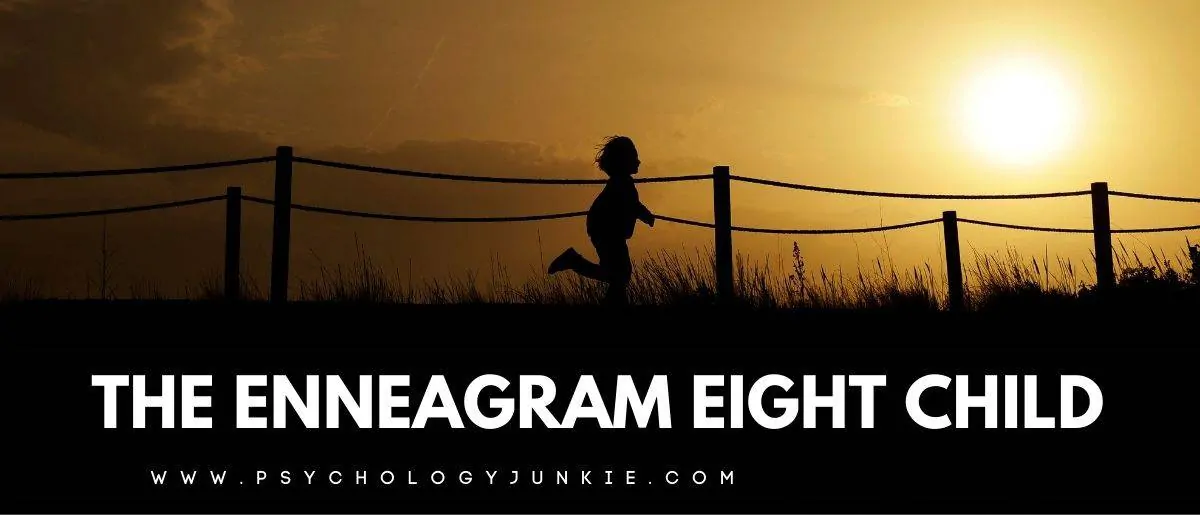The Enneagram Eight Child
Labeled “The Challenger,” Enneatype 8 children are often recognized for their fiery tempers, impulsive behaviors, or defiance towards control and authority. But is that really all there is to an 8 child? Is bluster and fury the sum of all their parts? While there’s more to any individual than their Enneagram type, today we’re going to explore some of the nuances of the Enneagram 8 child, along with some ways to recognize them in daily life.
Not sure what your Enneatype is? Take our free Enneagram questionnaire here.

Table of contents
Estimated reading time: 7 minutes
An Overview of the Eight Enneatype:
- Part of the Body triad (along with Enneatypes One and Nine)
- Can have a 9 wing or a 7 wing
- Vice: Lust
- Virtue: Innocence
- Integrates to the Two under growth
- Disintegrates to the Five under stress
- Basic Fear: Of being controlled or harmed by others
- Basic Desire: To be in control of their own life and destiny
Signs Your Child Might Be an Eight Enneatype:
- They take control of situations and naturally gravitate towards leadership
- They have a great deal of energy and strength
- They embrace their angry side and lose their temper more easily than others
- They are stubborn
- They speak with a sense of authority uncommon for their age
- They want more independence than most children
- They want to learn how to do things themselves
- They don’t like to be “helped”
- They question the rules if they aren’t logical or fair enough for their liking
- They want to prove that they are capable and competent
- They are fiercely protective
- They seem to crave intensity
- They don’t have a “filter,” and readily let people know what they think of them
- They hate phoniness
- They can be vengeful
The Strengths of the Enneagram Eight Child:
Eights have an incredible drive to prove their competence and independence in the world. With an Eight child, you won’t have to worry as much about peer pressure as you would with many other types. They want to be the driver of their own lives and are less concerned about what the masses think of them. They can also be very protective of underdogs, misfits, or children who are bullied. If they have a friend who struggles to speak up for themselves, you can bet that an Eight child will stand up for them against any bullies or abusers. Eight children see the world as a dog-eat-dog kind of place, and they don’t want themselves or their friends to be eaten. Of course, if Eights are raised in abusive families, they may wind up being the bullies. Because they’ve had to repress their sensitivity and vulnerability in order to survive, they may see signs of sensitivity or vulnerability as “weak.” However, average to healthy Eight children are more likely to protect others from bullies than be bullies themselves.
Eights have a lot of willpower to make things happen and take action in life. They don’t like to be held back and are willing to work hard and put blood, sweat, and tears into their dreams and ambitions. They have a lot of energy and are unlikely to be dissuaded by naysayers. In fact, one of the surest ways to get an Eight child to do something is to tell them they “can’t” do it.
While appearances might show otherwise, Eight children are often deeply sensitive and caring. While they might seem all strength and outspokenness on the outside, they have a gentle and tender side if you stick with them long enough to see it. They often want to be the “heroes” to other, more vulnerable people. They want to be the strong, bold protectors of the afraid or hurting. Unfortunately, if Eights have traumatic childhoods, they may try to bury this sensitive, vulnerable side so they will never be hurt or taken advantage of by others again.
The Struggles of the Enneagram Eight Child:
Eights often feel misunderstood by others. So many people are quick to judge them because of their outspoken and sometimes brash manner that they don’t give them the chance to show both sides of their personality. Parents may yell at Eights or roll out harsh punishments because they argue against the rules or have such intense reactions to things. Eights may be so busy fighting their own battles and protecting themselves from the judgments or punishments of others that they don’t get to show their inner gentleness and thoughtful nature. Don Richard Riso and Russ Hudson state that, “Most Eights recall some pivotal childhood crisis in which they realized that they could no longer afford to be so open, and feel this intensely as one of the greatest tragedies of their lives.” – Personality Types: Using the Enneagram for Self-Discovery
Eight children often feel like they need to be the tough, strong, decisive people in their families. This is especially true if they have wishy-washy parents or a parent who puts up with abuse or is codependent. They may feel like they need to suppress fear, vulnerability, or sensitivity so that they can be “tough” for their parents, siblings, or for their own survival. Sometimes, especially in unhealthy living conditions, Eights are afraid that others don’t love them, and unfortunately, they are often too focused on being strong that they don’t want to admit the extent to which they want and love others.
Eights struggle with the expectations and manners that are expected, and often demanded, of them by their parents. Social norms and tact often seem phony to them, and Eights hate anything that seems bogus or contrived. They like to speak their minds directly, and manners often feel like an unnecessary waste of time. They often feel silly or embarrassed when they’re forced to behave nicely towards people they don’t like.
Tips for Parenting an Enneagram Eight Child:
- Realize that there’s more to your child than the feelings or the defiance they might show on the surface. Take time to let them work through their feelings and realize that there’s an extra layer of gentleness and vulnerability underneath all of that.
- Be straightforward and up-front with them about your feelings, rules, and expectations. If you’re vague or wishy-washy they’ll just get irritated.
- Pick and choose the manners that you’re going to prioritize. Be logical about it and don’t expect them to put on an act for others.
- Be authentic with your child. Keep an eye out for hypocrisy in your own life that might make them lose respect for you and the rules you’re trying to enforce.
- Give them opportunities to prove themselves and their competence. Allow them more independence as they handle tasks and responsibilities well. Show that you notice what they’re accomplishing.
- Don’t expect them to respect authority just because they’re told to. Realize that they will want someone to prove their competence before they give them their respect.
- Give them lots of hugs and affection, even if they seem brittle or confrontational sometimes. Be gentle with them so that they can feel freer to show the gentleness they have inside.
- Make sure that you’re being the adult in the relationship. Eight children are still children even if they may try to be strong and in-charge. They need to know that you are still going to act like their parent even when times get hard.
What Are Your Thoughts?
Was this article helpful to you? Do you have any insights or experiences to share? Let us know in the comments!
Find out more about your personality type in our eBooks, Discovering You: Unlocking the Power of Personality Type, The INFJ – Understanding the Mystic, The INFP – Understanding the Dreamer, and The INTJ – Understanding the Strategist. You can also connect with me via Facebook, Instagram, or Twitter!

Subscribe to Our Newsletter

Want to discover more about personality type? Get the inside scoop with Susan Storm on all things typological, along with special subscriber freebies, and discounts on new eBooks and courses! Join our newsletter today!













This was my childhood in a nutshell. Be the strong one and no one can control you, is my motto.
Very insightful.
Thank you for this insight. But…I have more questions. I personally am an atypical 8, and I struggle with parenting my straight ahead 8 son. He has become very direct and uses his words to really express anger toward me in any (even slight) confrontation. What might “act like the adult” look like in this situation? Sending him to cool off in his room, or time out, etc., doesn’t work, since 8s don’t want to be controlled. Telling him lovingly that those types of words are “mean,” or “won’t be tolerated” leads to a “I don’t care” or some type of mocking mimicry. I don’t feel like I have the tools to handle it well. I usually resort to forcing him to take a brake in his room to avoid punishment like removal of some video game time, etc. But that doesn’t solve my own pain from the verbal assault, nor does it quiet the house down, as he flies into a yelling spree in his room that the whole house get’s to be a part of.
Any advising would be greatly appreciated…
As an 8 with a younger (suspected) 8 child, this may not apply to your circumstances. However, what I’ve learned is that in those moments of anger, nothing really gets through. So, I don’t try to persuade him or argue with him. I just stay present with him, gently note that I see his anger (which usually makes him more angry), and I quietly ride it out with him. If he tries to argue with me, I just keep my responses short and neutral. I stay in the same room, and I just focus on my breathing while he expresses what he’s feeling. Once he’s calmer we can usually talk about what is going on for him (and sometimes that’s hours later). But in the heat of the moment, he’s really not going to hear what I have to say anyway. Anyway, this might not work with an older child or your child, but it’s helped me try to let go of control of his angry outbursts.
Thank you! I don’t know if my daughter is an 8 yet, but she’s often oppositional and tries to take the lead in situations. Your comment helped me.